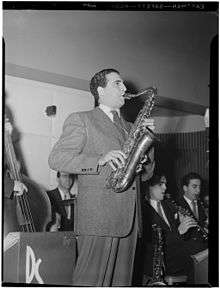Dick Stabile
Dick Stabile (May 29, 1909 – September 18, 1980) was an American jazz saxophonist, clarinetist, and bandleader.

Dick Stabile | |
|---|---|
 Stabile in New York in the 1940s | |
| Background information | |
| Birth name | Richard Dominic Stabile |
| Born | May 29, 1909 Newark, New Jersey, U.S. |
| Died | September 18, 1980 (aged 71) New Orleans, Louisiana |
| Genres | Jazz, big band |
| Occupation(s) | Musician, band leader, music director |
| Instruments | Saxophone and clarinet |
| Years active | 1928–1980 |
| Labels | Decca, Bluebird, Vocalion |
| Associated acts | Ben Bernie, Dean Martin, Jerry Lewis |
Career
The son of a band leader and violinist, Stabile learned piano and violin at an early age. His father got a job with band leader Vincent Lopez on the condition that he learn saxophone. Seeing his father play, Stabile started playing saxophone, too, and was hired by Jules Ansel at the Brunswick Hotel in Newark. He then went on tour with band leader Ben Bernie, Ansel's cousin,[1] and remained with Bernie from 1928–1935, appearing on Bernie's weekly radio show as lead alto saxophonist and soloist.[2]
In 1935 Stabile started his own ensemble, the All-America "Swing" Band, which featured Bunny Berigan, Dave Barbour, Frank Signorelli, and Stan King.[3] He recorded with vocalists such as Berigan, Paula Kelly, Burt Shaw, and Gracie Barrie, the last of which he would go on to marry. During this time, he recorded for the labels Decca, Bluebird, ARC, and Vocalion/Okeh. His band worked often in hotels in New York City and was chosen to play at the New York World's Fair in 1959–60.
During World War II Stabile led a band while serving in the Coast Guard; Gracie Barrie led his ensemble in his absence. After the war, he moved to Los Angeles and became music director for Dean Martin and Jerry Lewis and even had a small role as Private Pokey in their film At War with the Army.[4][5]
After spending the latter 1960s leading dance bands at Los Angeles ballrooms, Stabile took a job at the Hotel Roosevelt in New Orleans, where he worked from the middle of the 1970s until his death from a heart attack in 1980.
Vocalists
Evelyn Oaks sang with Stabile's orchestra in 1939,[1] and Paula Kelly sang with him prior to joining the Glenn Miller Orchestra in 1941.[6]
Instruments
Stabile designed a line of saxophones and clarinets that carried his name.[7]
Personal life
Stabile was married to and divorced from Gracie Barrie.[8]
Stabile was the cousin of singer Dolly Dawn (aka Theresa Stabile)[9]
Discography
As leader
References
- "Dick Stabile To Play For Exchange Club". The Evening Standard. April 28, 1939. p. 18. Retrieved October 12, 2015 – via Newspapers.com.

- Stabile, Joe E. "Dick Stabile by Joe E. Stabile". Dick Stabile. Retrieved 16 May 2017.
- "(Lakewood ad)". The Plain Speaker. April 15, 1936. p. 18. Retrieved October 13, 2015 – via Newspapers.com.

- Simon, George T. (1974). The Big Bands. Collier Books. P. 479.
- Jordan, Steve, and Tom Scanlan. Rhythm Man: Fifty Years in Jazz. University of Michigan Press, 1991, p. 89.
- "Swing era lives again". The Courier-Gazette. April 27, 1978. p. 11. Retrieved October 13, 2015 – via Newspapers.com.

- "(Penn State Music and Sports Supply House ad)". The Daily Courier. April 25, 1940. p. 5. Retrieved October 13, 2015 – via Newspapers.com.

- Winchell, Walter (October 24, 1945). "Walter Winchell Coast-To-Coast". Naugatuck Daily News. p. 4.
- Douglas Martin. "Dolly Dawn, 86, Who Sang Center Stage in the Big Band Era - The New York Times". Nytimes.com. Retrieved 2019-11-13.